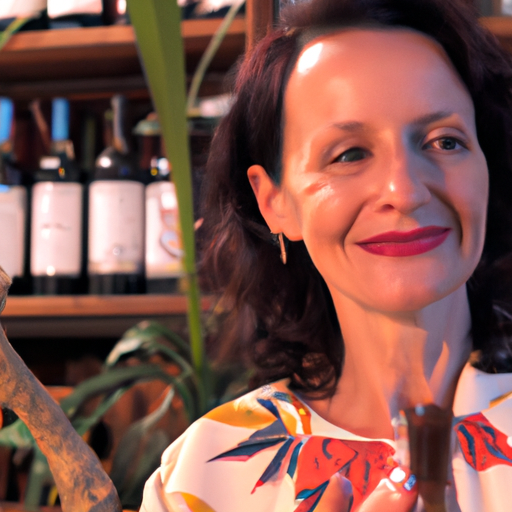
The Journey of Mia Wines: From Inception to Success
An Interview with Gloria Collell, Founder of Mia Wines
Gloria Collell, the founder of Mia Wines, has had an incredible journey from the inception of her company to its current success. In a recent interview, she shared the story of how Mia Wines came to be and the challenges she faced along the way.
Collell’s passion for wine began at a young age. Growing up in a family of wine enthusiasts, she was exposed to the world of winemaking from an early age. This early exposure sparked her interest and set her on a path to pursue a career in the wine industry.
After completing her studies in oenology, Collell gained valuable experience working for renowned wineries around the world. It was during this time that she honed her skills and developed a deep understanding of the intricacies of winemaking. Armed with this knowledge, she felt ready to embark on her own entrepreneurial journey.
The idea for Mia Wines came to Collell during a trip to the picturesque vineyards of Spain. Inspired by the beauty of the landscape and the rich history of winemaking in the region, she decided to create a brand that would capture the essence of Spanish wines and bring them to a global audience.
However, starting a wine company from scratch was no easy task. Collell faced numerous challenges, from securing funding to finding the right suppliers and distributors. She had to navigate the complex world of regulations and certifications, ensuring that her wines met the highest standards of quality.
Despite these obstacles, Collell remained determined and focused on her vision. She assembled a team of experts who shared her passion and worked tirelessly to bring Mia Wines to life. Together, they carefully selected the finest grapes and employed traditional winemaking techniques to create wines that were both authentic and exceptional in taste.
One of the key factors that contributed to the success of Mia Wines was Collell’s commitment to sustainability. From the vineyards to the bottling process, every step was carefully planned to minimize the company’s environmental impact. Collell firmly believes that great wine should not come at the expense of the planet, and this philosophy resonated with consumers who were increasingly conscious of their purchasing choices.
As Mia Wines gained recognition for its quality and sustainability, the brand started to attract attention from wine enthusiasts and critics alike. The company’s wines began to win prestigious awards, further solidifying its reputation as a producer of exceptional Spanish wines.
Looking to the future, Collell has ambitious plans for Mia Wines. She aims to expand the company’s reach and introduce new varietals to the market. Collell also wants to continue pushing the boundaries of sustainability in winemaking, exploring innovative techniques that will further reduce the company’s carbon footprint.
In conclusion, Gloria Collell’s journey from the inception of Mia Wines to its current success is a testament to her passion, determination, and commitment to quality. Through hard work and perseverance, she has created a brand that not only produces exceptional wines but also prioritizes sustainability. As Mia Wines continues to grow, it is clear that Collell’s vision and dedication will continue to drive its success in the years to come.
Gloria Collell’s Entrepreneurial Insights: Lessons Learned from Building Mia Wines

An Interview with Gloria Collell, Founder of Mia Wines
Gloria Collell is a successful entrepreneur and the founder of Mia Wines, a renowned winery that has gained recognition for its exceptional quality and unique flavors. In this interview, Collell shares her insights and lessons learned from building Mia Wines, offering valuable advice for aspiring entrepreneurs.
Collell’s journey in the wine industry began with a deep passion for winemaking. Growing up in a family of wine enthusiasts, she developed a keen interest in the art of crafting exquisite wines. This passion eventually led her to pursue a career in the wine industry, where she gained invaluable experience working for various wineries.
One of the first lessons Collell learned was the importance of perseverance. Building a successful winery is no easy task, and there were numerous challenges along the way. From securing funding to finding the right vineyards and establishing a strong distribution network, Collell faced many obstacles. However, she never gave up and remained determined to turn her vision into a reality.
Another crucial lesson Collell learned was the significance of building a strong team. She emphasizes the importance of surrounding oneself with talented individuals who share the same passion and dedication. Collell believes that a cohesive team is essential for the success of any business, as it allows for the pooling of diverse skills and expertise.
Collell also highlights the importance of innovation in the wine industry. With an ever-evolving market and changing consumer preferences, it is crucial to stay ahead of the curve. Mia Wines has gained recognition for its innovative approach to winemaking, introducing unique blends and experimenting with new techniques. Collell believes that innovation is key to staying relevant and attracting new customers.
In addition to innovation, Collell stresses the importance of quality. She firmly believes that producing exceptional wines is the foundation of any successful winery. From carefully selecting the finest grapes to employing meticulous winemaking techniques, Mia Wines has always prioritized quality above all else. Collell advises aspiring entrepreneurs to never compromise on quality, as it is what sets a brand apart from its competitors.
Collell also shares her insights on the importance of branding and marketing. In a highly competitive industry, it is crucial to create a strong brand identity and effectively communicate it to consumers. Mia Wines has successfully built a brand that resonates with its target audience, combining elegance, sophistication, and a touch of playfulness. Collell believes that a well-defined brand image is essential for attracting and retaining customers.
Lastly, Collell emphasizes the significance of adaptability. The wine industry is constantly evolving, and it is essential to adapt to changing trends and consumer preferences. Mia Wines has successfully adapted to the growing demand for organic and sustainable wines, introducing a range of eco-friendly options. Collell advises entrepreneurs to always be open to change and willing to adapt their strategies to stay ahead of the competition.
In conclusion, Gloria Collell’s entrepreneurial journey with Mia Wines offers valuable insights and lessons for aspiring entrepreneurs. From the importance of perseverance and building a strong team to the significance of innovation, quality, branding, and adaptability, Collell’s experiences highlight the key factors that contribute to the success of a winery. Her story serves as an inspiration for those looking to enter the wine industry or any other entrepreneurial endeavor.
The Future of Wine Industry: Trends and Innovations Explored in the Interview with Gloria Collell
An Interview with Gloria Collell, Founder of Mia Wines
The wine industry has always been steeped in tradition and history, but as the world evolves, so does the wine industry. To gain insights into the future of the wine industry, we had the privilege of interviewing Gloria Collell, the founder of Mia Wines. With her extensive experience and innovative approach, Collell provided valuable insights into the trends and innovations shaping the future of the wine industry.
One of the key trends that Collell highlighted is the growing demand for sustainable and organic wines. Consumers are becoming increasingly conscious of the environmental impact of their choices, and this extends to the wines they consume. Collell emphasized the importance of sustainable practices in vineyards, such as organic farming and minimal use of chemicals. She believes that wineries that prioritize sustainability will have a competitive edge in the future.
Another trend that Collell discussed is the rise of technology in the wine industry. From vineyard management to winemaking processes, technology is revolutionizing every aspect of the industry. Collell mentioned the use of drones for vineyard monitoring, which allows for more precise and efficient management. Additionally, she highlighted the use of artificial intelligence in predicting wine quality and optimizing production processes. According to Collell, wineries that embrace technology will be better equipped to meet the evolving demands of consumers.
Collell also touched upon the importance of innovation in packaging and marketing. With the rise of e-commerce and direct-to-consumer sales, wineries need to find creative ways to stand out in a crowded market. Collell emphasized the need for eye-catching and sustainable packaging that reflects the brand’s values. She also highlighted the power of social media and influencer marketing in reaching a wider audience. According to Collell, wineries that can effectively leverage these innovations will have a competitive advantage in the future.
When asked about the impact of climate change on the wine industry, Collell expressed her concerns. She noted that rising temperatures and changing weather patterns pose significant challenges to vineyards around the world. However, she also highlighted the resilience and adaptability of winemakers. Collell believes that wineries that invest in research and development to adapt to these changes will be better positioned for success in the future.
In terms of consumer preferences, Collell discussed the growing interest in unique and lesser-known grape varieties. While traditional grape varieties will always have their place, consumers are increasingly seeking out new and exciting flavors. Collell emphasized the importance of experimentation and innovation in winemaking to cater to these evolving tastes. She also mentioned the rising popularity of natural wines, which are made with minimal intervention and additives. According to Collell, wineries that can offer a diverse range of wines to cater to these preferences will thrive in the future.
In conclusion, Gloria Collell’s insights shed light on the future of the wine industry. From sustainability and technology to packaging and consumer preferences, the industry is undergoing significant changes. Wineries that embrace these trends and innovations will be well-positioned for success in the future. As the wine industry continues to evolve, it is clear that innovation and adaptability will be key to staying ahead in this ever-changing landscape.






